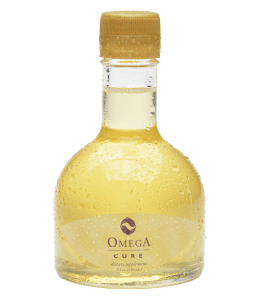Full-Spectrum Fish Oil: Why It Matters to Omega-3 Consumers
This morning, as I was out for my daily trip with my walking partner, I couldn’t help sounding like a broken record as I once again touted the benefits of Omega Cure®. The subject: the latest exciting findings on omega-3 fish oil and cancer prevention.
Only the night before, I’d run across the results of the study “Epoxy Metabolites of Docosahexaenoic acid (DHA) Inhibit Angiogenesis Tumor Growth and Metastasis” from the University of California, Davis. The team explored how omega-3 fish oil helped treat cancers, and discovered that the metabolites of omega-3 – the omega-3 derivatives found in full-spectrum fish oil – inhibit tumor growth and metastasis.
The study beautifully supports what we’ve been trying to get across to our customers for years: Consumers should not just take one member of the omega-3 fatty acids family, but should strive to get the wide range of the natural fatty acids and their co-factors as found in full-spectrum fish oil.
The UC Davis study focused on the multitude of nutrients found in fish oil. Moreover they uncovered their potent anti-cancer properties. Many foods in our diet – including garlic, olives, and tomatoes – are powerful health foods, but we are still uncertain how the different ingredients work together. What we need to keep in mind is that cell metabolism and the physiological pathways within the body depend on many different types of nutrients.
This whole foods and whole nutrients approach contradicts current fish oil manufacturing trends. The majority of fish oil manufactures now focus on producing prescription or pharmaceutical omega-3s. These prescription omega-3s concentrate the fish oil into new chemical structures called ethyl esthers, not found in nature. Furthermore, these concentrates contain just one or two isolated types of omega-3s: the popular EPA and DHA. What these fish oil manufacturers are not aware of is that by isolating just the EPA or DHA, they strip the oil of other potent omega-3 forms, as well as their derivatives and metabolites. By modifying Mother Nature’s perfect blend, the prescription manufacturers are removing nutrients that could potentially yield significant health benefits.

Part of the problem stems from the tension between science and the corporate world. As scientists seek to uncover what aspects of a food or an ingredient makes it “work,” they need to single out just one or two nutrients. This process explains why fatty acids like EPA and DHA have gained such attention over the years. As the main “work horses” of the omega-3 family, researchers have focused almost exclusively on the EPA and DHA for the last 30 years, ignoring the other members of the omega-3 family until recently. While there is no problem with this approach, the trick comes when manufacturers take the “trees for the forrest” approach to creating products. Mother Nature rarely operates as a one-woman show. Instead, she usually orchestrates a multitude of players that depend on each other and work in synergy.
That is why separating out just EPA or just DHA doesn’t make sense. Omega-3 research is still a work in progress, and by removing other important omega-3s from the equation, manufacturers are likely removing important nutrients from their oil.

At Omega3 Innovations, we only use full-spectrum omega-3 fish oil in our products. Our oil has neither been skimmed nor chemically modified in any way. By purifying the oil and letting the rest of the nutrients remain intact, we provide customers with a fuller range of the natural nutrients necessary to fight against various disease states.
High quality nutrition is key in solving many of our health problems. We hope that by raising awareness of fresh, full-spectrum oil, we can encourage the industry to move towards a holistic approach to medicine.
Until that time comes, my morning walking partner will just have put up with my singing: “Viva fresh, full-spectrum Omega Cure.”
Popular posts



Related posts






